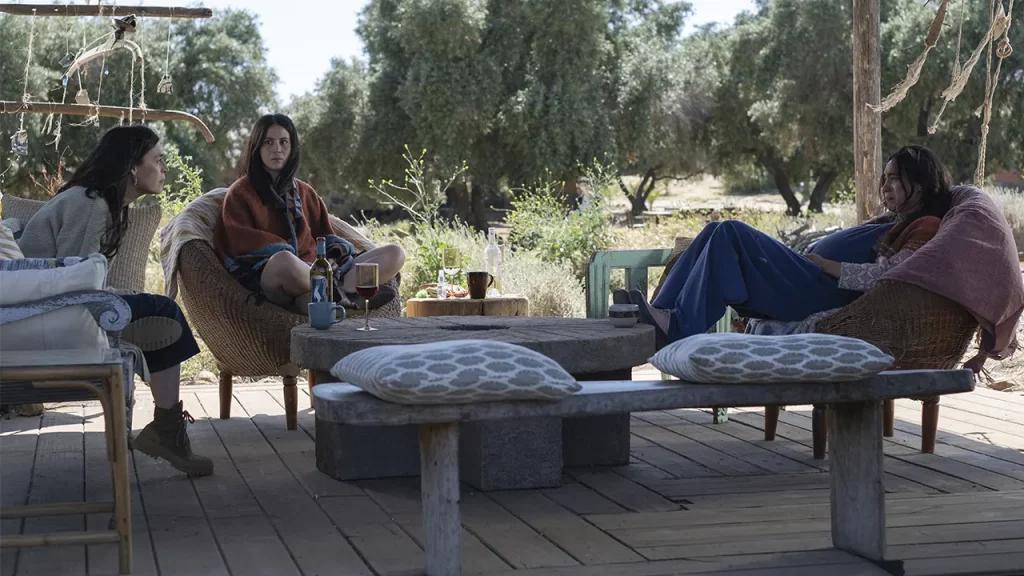From the moment Familia begins, one senses right away that Rodrigo García has crafted something intimate, deliberate, and quietly powerful — a film that refuses spectacle and instead trusts in the small fissures of connection, memory, conflict, and love to carry its weight. In a cinematic landscape saturated with bombast, this is a welcome reminder of how much drama, and how much beauty, can unfold in a single afternoon, simply by putting a group of people in a room and letting their pasts and present demands collide.

The film’s conceit is deceptively simple: Leo (played with haunting gravity by Daniel Giménez Cacho) is a patriarch of a sprawling olive ranch in Mexico’s Valle de Guadalupe. He still lives on the land where his children grew up, where their mother’s ashes lie in the soil, where laughter and disputes, secrets and resentments have all threaded themselves into the trees. He calls his family together — his daughters Rebeca, Julia, and Mariana, and his son Benny — with a request: he has received an offer to sell the ranch, and he wants them to share in deciding its fate. Around one long lunch table, amid wine, shared jokes, and growing unease, the threads of each person’s life are tugged into the open.

What makes Familia so compelling is how it weaves multiple intersecting lives without ever feeling overcrowded. Leo is a figure at once commanding and vulnerable — he knows the land, he knows the weight of history, and yet he is quietly aging, uncertain. His daughters return with their own frustrations: Rebeca, a successful doctor married to an American, juggles the distance between what she and her children expect; Julia, a writer by lineage and temperament, struggles with marital infidelity she can’t quite contain; Mariana, deeply pregnant and newly in love, brings with her tension about identity, ownership, and belonging. Benny, meanwhile, lives with special needs, and his presence is handled with dignity, giving the narrative a layer of emotional depth and respect for difference. The film also gives space to Clara (Leo’s partner) and the housekeeper Teresa, reminding us that every household is shaped by many hands and histories, not just blood ties.
Much of the film unfolds in one location, and that concentration is itself a form of cinematic discipline. García trusts in dialogue, glances, silences. He lets moments linger. A daughter interrupts mid-sentence. The patriarch raises his eyebrow. The sun drips across the patio. A cousin volunteers something he shouldn’t. That the tension builds not from manufactured plot contrivance but from the pressure of proximity is one of the film’s greatest strengths. In this respect, Familia belongs to a tradition — think of the great stage-like family dramas in cinema — but García gives it his own voice: the emotional arcs feel lived-in, flawed, sometimes ugly, often loving.

There is a fascinating oscillation in the tone: laughter in the face of grief, sharp rebuke softened by apology, pride tangled with shame. Leo, once the unquestioned center, is revealed to carry resentments, unspoken criticisms, blind spots born of a lifetime of assuming things will stay as they are. His daughters bear those assumptions differently: some have fled, others returned; some press for clarity, others harbor silent doubts. No one is entirely right, no one entirely wrong. García resists easy moralizing; he offers us a lens into a family in conversation with its contradictions.
The cinematography deserves praise. The light through olive branches, the timeworn textures of adobe walls, the steady framing of the table, the occasional tilt to capture something off-balance — everything reinforces that the ranch itself is a character in the story. It holds memory. It invites confrontation. It witnesses how people shift around it. In one scene, the camera holds steady on a window, showing family members as reflections, multiple planes colliding — as if to ask which angle we choose when we recall our pasts. These visual decisions are quiet but resonant.
And the performances — they elevate the film from fine to unforgettable. Giménez Cacho gives Leo depth without caricature; when he smiles, you feel the weight behind it; when he pauses, you sense the regret. Ilse Salas, Cassandra Ciangherotti, Natalia Solián — these daughters carry their grievances with tenderness and tension. The chemistry between them, the way they snap and fold and circle back, feels unforced. Mariana’s scenes with Monica are graceful and brave, dissolving assumptions about what it means to bring new life and love into a setting haunted by past expectations. Even in moments of silence, each actor gives us something to hold onto.

It is a testament to García’s skill that Familia never feels talky or static, even though much of it is conversation. There are no grand gestures — no bombshell revelations so much as incremental cracks. Still, by the final act, the emotional current is undeniable. The choice Leo presents — to sell or to stay — becomes symbolic: what do you preserve, what do you let go? But the film isn’t about the decision itself so much as the process of arriving at it, of hearing what has long been muffled, of asking: who are we when the land no longer binds us, and what do we carry forward?
One of the film’s quiet virtues is how it handles memory. The absence of the mother — her presence in stories, in silences, in what has been left behind — shapes every conversation. A daughter remarks how the orchard row they planted at ten years old is now overgrown. Another recalls something said at their mother’s funeral. These recollections are not flashbacks but emotional echoes, woven into the present. The film seems to say that family is not only what we see, but what we no longer see — the haunts we carry, the things unsaid.
There is also a precise moral complexity. For instance, when Leo presses Mariana about her choice of partner, or about the identity of the child’s father, the conversation bristles — but García doesn’t write Leo as irredeemable. He shows a man trying, poorly at times, to bridge generational and emotional divides. This is the film’s bravery: to let characters mess up, to let love and resentment coexist. Often in family dramas one side becomes the villain; here, the deeper insight is that in loving someone you sometimes wound them, and in stepping back you sometimes break them.

The pacing is judicious. The film takes its time, but never lingers just to linger. Each beat — a glance, an interruption, a sip of wine — is timed to let us breathe and to let tension build. The choice to spend nearly all the film in that lunch gathering is bold; yet the moments outside the table, the walk through olive groves, a child’s question in the shade, a kitchen exchange — they frame the interior world with a broader sense of place, history, and consequence.
One might say Familia is a film about endings. The ending of a property, of a chapter, perhaps of illusions. But it is equally, and more beautifully, about beginnings: of renewed listening, of fractured paths that might reweave, of futures uncertain yet possible. It doesn’t wrap things neatly, precisely because life rarely does; instead it leaves us with the sense that family — messy, maddening, beloved — is a work perpetually in progress.
What is most refreshing is that Familia feels specific and universal at once. It is steeped in Mexican identity — the land, the light, the cadence of Spanish conversation, the interplay of tradition and modernity — yet it doesn’t become provincial or boxed. The themes are global: how do we negotiate inheritance (material and emotional), how do we reconcile who we’ve been with who we want to be, how do we speak truth to those we love? The film doesn’t pretend to answer all these, but it offers space to feel them.
Watching Familia, I was reminded of great ensemble dramas where the weight is in the in-between: John Cassavetes, some of Bergman’s later works, even elements of Chekhovian family rooms. But García finds his own landscape. He uses quiet to make noise. He lets a simple gathering become a crucible. He trusts his actors and trusts his audience to fill the silences.
In the end, Familia is a film that stays with you. Long after the credits roll, you carry the glances, the hesitations, the unresolved threads. You think: what would I say if I sat around that table? What secrets would I hide? What land would I cling to? And in those reflective moments, you realize the strength of this film lies not in answering, but in asking — asking with empathy, asking without judgment, asking with love, even when love is flawed.
This is not a film for those looking for spectacle or bombast. It is a film for those who want to be held — to watch people push and pull, to feel the ache of roots, to taste regret and longing, and to hope that conversation, however messy, can begin to heal. Rodrigo García has created something rare: a quiet wonder, a testament to the weight and grace of family. Familia is more than a film. It is a mirror, a question, and a long, deep breath.


